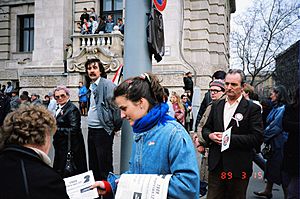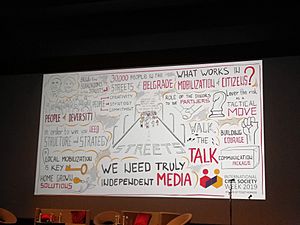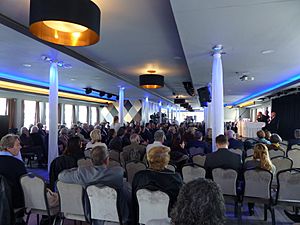Civil society facts for kids
Civil society is like the "third part" of society. It's different from the government (which makes laws) and business (which makes money). It includes things like your family and your personal life.
Sometimes, civil society means all the groups and organizations that are not part of the government and work to help citizens or express their wishes. It can also mean the things that make a democracy work, like freedom of speech or fair courts. In some parts of Europe, civil society also means having good values as a citizen.
What Does "Civil Society" Mean?
The idea of "civil society" comes from an ancient Greek phrase, koinōnía politikḗ, used by a philosopher named Aristotle. He used it to describe a 'political community' in a Greek city-state. This community was formed by people working together to survive and live well. Aristotle believed humans were naturally social and political.
Later, Roman writers like Cicero used a similar idea for their republic. The term came back into use in Europe when Aristotle's writings were translated. Over time, it started to mean groups of landowners who had power, separate from the ruler. More recently, in the 1990s, people in Eastern Europe like Václav Havel used it to describe groups of citizens who stood up against strict government control.
Civil Society and Democracy
Many thinkers believe that civil society is very important for a democracy. When people join groups and organizations, they learn more about politics and become more informed citizens. This helps them make better choices when they vote. It also helps them hold the government responsible for its actions.
Civil society groups allow people with similar goals to work together. This helps develop democratic ideas. Being part of these groups gives people information and makes it easier for them to act together. These groups can then pressure governments to make certain policies. This means civil society helps balance the power of the government. The rules of these groups can even teach people how democratic decisions are made.
More recently, a scholar named Robert D. Putnam said that even non-political groups (like sports clubs or hobby groups) are important for democracy. He believes they build "social capital" – which means trust and shared values among people. When people trust each other, they are more likely to work together for the good of everyone. Countries with strong civil societies often have stronger democracies.
However, not everyone agrees. Some, like Thomas Carothers, point out that civil society groups don't always promote democratic values. For example, Sheri Berman showed how civil society groups in Germany were used to work *against* democracy during the time of the Weimar Republic. These groups, instead of bringing people together, sometimes made existing conflicts worse. This made it easier for the Nazi Party to gain power by taking advantage of these divisions. So, in this case, a strong network of civil society groups actually harmed democracy.
Even in countries with strong democracies, many special interest groups can sometimes make it harder for the government to work well. They might push for policies that only benefit the wealthy or well-organized. So, while civil society can help democracy, it can also create challenges.
In the United States, some believe that civil societies help people connect with the government. They can protect individual freedoms by checking the government's power. Others see them as helping the government with social causes. However, some argue that the government has more money and resources for social causes than many non-governmental organizations (NGOs).
Getting Involved in Politics
Civil society organizations teach citizens important things about politics. They explain citizens' rights and duties, different political issues, and how people can work together to solve problems in their communities. When people can act together and feel connected to others who share their goals, they are more likely to get involved in politics.
However, there can be downsides. Because these organizations are so influential, it can become harder for governments to meet all the different needs and preferences of a fast-changing society. Also, some groups focus only on one specific issue, which can sometimes make it harder to find solutions that work for everyone.
There is a lot of evidence that civil society groups increase political participation. For example, Robert Putnam studied civil society in Italy and found that people involved in these groups were more politically aware, trusted others more, and participated more in politics. Similarly, Sheri Berman found that the Nazi Party used strong civil society networks to get people involved in politics in Germany, which helped them become a powerful force. These examples show how important social networks are for political participation.
Civil Society and the Economy
A strong civil society is often seen as important for a good economy. These groups can offer valuable ideas for economic decisions. They can also help private businesses and new entrepreneurs. They can also stop the government from controlling the economy too much. For example, leaders of workers' unions can make sure that economic growth helps working people. Religious leaders can ask for more fairness in economic matters. Non-governmental organizations (NGOs) can point out and report harmful business practices.
Basically, civil society creates "social capital." The World Bank describes social capital as the relationships and norms that shape how people interact in a society. When there is more social capital, people depend on each other more, which can lead to higher productivity and economic growth. For instance, a study in the United States found that areas with stronger social networks had lower high school dropout rates.
However, some people, like Thomas Carothers, disagree slightly. He argues that while civil society is good for economic growth, it's not always *necessary*. He points to South Korea, which had great economic success without a strong civil society at first. He also mentions Bangladesh, which has a very rich civil society but remains one of the poorest countries. Carothers also suggests that too much civil society, especially in certain areas, can sometimes hurt the economy. For example, some economists believe that labor unions in Latin America have limited economic growth.
Civil Society Around the World
Today, many people use "civil society" to talk about social life that needs to be protected from globalization (the way the world is becoming more connected). They also see it as a source of resistance to globalization, because these groups often work across different countries. However, this idea is debated because civil society can also include businesses and organizations that support globalization.
After the fall of communism, civil society grew rapidly around the world. This was partly due to new economic strategies that encouraged countries to reduce government control and allow more private groups to operate.
On the other hand, some people believe that globalization actually helps spread ideas like freedom, which naturally leads to a bigger role for civil society and a smaller role for government.
The Department of Economic and Social Affairs (DESA) at the United Nations has a system called iCSO (integrated Civil Society Organizations) to help civil society groups work with them.
Civil societies also get involved in environmental issues. They help set goals for fixing harm to the environment. They also inform the public about environmental problems, which makes more people demand environmental changes.
History of the Idea
The meaning of "civil society" has changed twice from its original, ancient form. The first change happened after the French Revolution, and the second during the fall of communism in Europe.
Ancient Times
In ancient times, "civil society" was often seen as the same as a "good society" or the state. Philosophers like Socrates believed that disagreements in society should be solved through public discussions to find the truth. He thought this was important for a good life in the city. For Plato, an ideal state was a fair society where people worked for the common good and had virtues like wisdom and justice. Aristotle saw the city-state as a group of groups that allowed citizens to share in ruling.
The Roman idea of societas civilis was introduced by Cicero. In this period, the focus was on having a "good society" to keep peace and order. Philosophers didn't separate the state from society. They believed the state was the civil form of society, and "civility" meant being a good citizen. They also thought humans were rational and could shape their society and work together for peace.
During the Middle Ages, the idea of classical civil society mostly disappeared from discussions because of the unique political system of feudalism. Instead, philosophers focused on topics like just wars.
Early Modern History
After the Thirty Years' War in the 1600s, countries started to become sovereign states with clear borders. Rulers gained more control over their lands and people. This led to absolute rule in Europe, where monarchs had complete power.
However, during the Age of Enlightenment, thinkers began to question this absolute power. They asked why some people had more rights than others and why governments existed. They believed in the power of human reason. They thought the alliance between the state and the Church was bad for human progress because the state limited freedom and the Church supported the idea of divine rule for kings.
Philosophers like Thomas Hobbes and John Locke developed the idea of the social contract. They believed that people in a "state of nature" (without government) would live in chaos. To avoid this, people agreed to form a government to protect themselves. Hobbes thought a very powerful state (which he called Leviathan) was needed to keep order. Locke, on the other hand, believed in a limited state. He argued that people gave up some freedom to the government, but the government also had to protect their basic rights, like life, liberty, and property. If the government didn't do this, people had the right to resist it.
Both Hobbes and Locke saw civil society as a community that maintained a peaceful life, where rights came from natural laws. But they didn't see civil society as separate from the state. Their ideas greatly influenced later thinkers. Enlightenment thinkers like Jean-Jacques Rousseau and Immanuel Kant believed that people were peaceful and that wars were caused by absolute rulers. They argued that a system with different groups could prevent one group from having too much power.
Modern History
G. W. F. Hegel changed the meaning of civil society. He saw it as a separate area of society, different from the state. For Hegel, civil society was about economic relationships in modern capitalist society, focusing on individual rights and private property. He used the German term "bürgerliche Gesellschaft" to mean "civilian society," regulated by civil laws.
Karl Marx followed Hegel's idea. For Marx, the modern state created a civil society where private interests competed. He believed the state was controlled by the wealthy class. Marx hoped that one day, the state and civil society would reunite, and the working class would control society.
Antonio Gramsci had a different view. He saw civil society as a place where the ruling class spread its ideas and values to maintain its power. But he also saw it as a place where problems could be solved and where people could challenge the ruling class. Later, thinkers used Gramsci's ideas to argue that civil society could protect people from the state and the market, and help people influence the state.
Recent History

Many believe that the modern understanding of civil society came from political groups in Eastern Europe in the 1980s, who were opposing the Soviet system. However, some research suggests that this idea was also promoted by communist propaganda to support new economic changes. This led to the idea of civil society as a "third sector" that could take over some roles of the welfare state (government services).
After the 1990s, with the rise of non-governmental organizations (NGOs) and new social movements around the world, civil society became seen as a key area for creating a different social and world order. Today, the study of civil society is more balanced, but there are still differences in how it's understood in richer countries versus developing countries.
Civil Society and Public Discussion
Jürgen Habermas said that the "public sphere" is where people can have rational and democratic discussions. He saw civil society as the area of economic activity, and the public sphere as part of the political world. When a civil society becomes more active and includes many people, and when the government isn't controlled by just one political party, it can start to challenge authority. When individuals and groups start to speak out against the government or demand solutions to social needs, civil society begins to grow.
Types of Civil Society Organizations
Civil society organizations, also called civic organizations, include many different groups:
- Universities and research groups
- activist groups
- Charities
- Clubs (like sports clubs or social clubs)
- community foundations
- community organizations
- consumer organizations
- cooperatives
- Foundations
- non-governmental organizations (NGOs)
- non-profit organizations (NPOs)
- private voluntary organizations (PVOs)
- professional associations
- religious organizations
- social enterprises
- social movement organizations
- statutory corporations
- support groups
- trade unions (groups for workers)
- voluntary associations
See also
 In Spanish: Sociedad civil (ciencia política) para niños
In Spanish: Sociedad civil (ciencia política) para niños
- Portal:Politics
- Activism
- Anarchism
- Associationalism
- Civic engagement
- Civics
- Civic space
- Civic virtue
- Civil affairs
- Civil inattention
- Civil liberties
- Civil religion
- Civil and political rights
- Communitarianism
- Communism
- Constitutional economics
- Coordination good
- Cultural hegemony
- Democracy
- Foucault–Habermas debate
- Global civics
- Global governance
- Human rights
- Judiciary
- Liberal nationalism
- Mass society
- Non-state actor
- Open society
- Political science
- Public interest litigation
- Rule of law
- Rule According to Higher Law
- Social capital
- Social economy
- Social entrepreneurship
- Social innovation
- Sociology
- Service organization
- Power
- Voluntary sector
- Yearbook of International Organizations
 | Shirley Ann Jackson |
 | Garett Morgan |
 | J. Ernest Wilkins Jr. |
 | Elijah McCoy |



